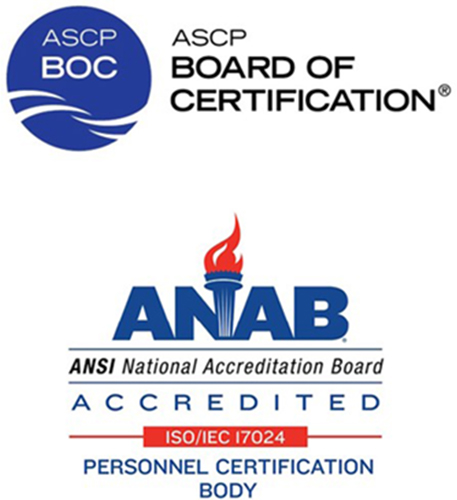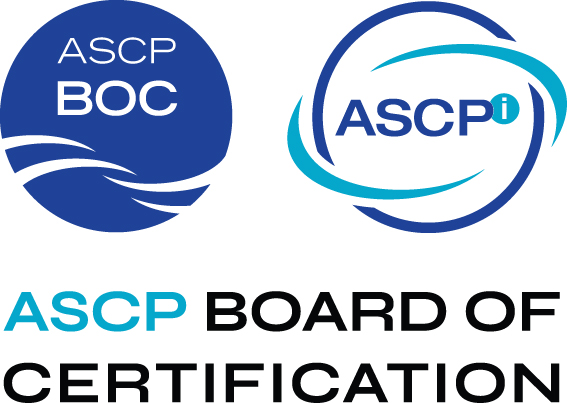Obtain certification and advance your career in laboratory management with our specialized credential.
Directs, manages, or supervises a laboratory and has responsibility for finances, operations, personnel, and compliance.
Each credential has specific eligibility requirements. It’s your responsibility to confirm that your education, training, and/or experience meet the criteria. Submit the correct documentation with your application. Once submitted, the category and route of application cannot be changed.
Check Your EligibilityAn applicant must be able to verify that they meet all eligibility requirements, including education, training, and/or experience. For complete information, see the Documentation section of the website.
Education does not need to be from the United States. Details are available by reviewing the webpage titled Acceptable Education, also available in the routes below.
To be eligible for this examination category, an applicant must satisfy the minimum requirements (for degrees, the stated degree or higher) of at least one of the following routes:


MBA, MHA, or other management-related master’s degree from an accredited (regionally or nationally) college/university,
AND 2 years of full-time acceptable experience in clinical* laboratory supervision or management in an acceptable laboratory within the last 5 years that must be documented on this Experience Documentation Form.
*Acceptable Clinical Laboratory:
CMS CLIA certificate of registration, compliance, accreditation;
OR DoD CLIP certificate of registration, compliance, accreditation;
OR JCI accreditation;
OR Accreditation under ISO 15189.
Additional Documents Required for the DLM Examination
If you own your own business, you must submit incorporation papers or other form of ownership documentation.
Experience
To fulfill the experience requirements for the Diplomate in Laboratory Management examination, you must have experience, within the time frame required, in 25 of the 37 areas listed below.
FINANCIAL MANAGEMENT
OPERATIONS MANAGEMENT
HUMAN RESOURCE MANAGEMENT
Succession planning and staff development
QUALITY MANAGEMENT
Valid ASCP scientist or specialist certification,
AND a master's degree from an accredited (regionally or nationally) college/university,
AND 2 years of full-time acceptable experience in clinical* laboratory supervision or management in an acceptable laboratory within the last 5 years that must be documented on this Experience Documentation Form.
*Acceptable Clinical Laboratory:
CMS CLIA certificate of registration, compliance, accreditation;
OR DoD CLIP certificate of registration, compliance, accreditation;
OR JCI accreditation;
OR Accreditation under ISO 15189.
Additional Documents Required for the DLM Examination
If you own your own business, you must submit incorporation papers or other form of ownership documentation.
Experience
To fulfill the experience requirements for the Diplomate in Laboratory Management examination, you must have experience, within the time frame required, in 25 of the 37 areas listed below.
FINANCIAL MANAGEMENT
OPERATIONS MANAGEMENT
HUMAN RESOURCE MANAGEMENT
Succession planning and staff development
QUALITY MANAGEMENT
Valid ASCP scientist or specialist certification,
AND a baccalaureate degree from an accredited (regionally or nationally) college/university,
AND 4 years of full-time acceptable experience in clinical* laboratory supervision or management in an acceptable laboratory within the last 8 years that must be documented on this Experience Documentation Form.
*Acceptable Clinical Laboratory:
CMS CLIA certificate of registration, compliance, accreditation;
OR DoD CLIP certificate of registration, compliance, accreditation;
OR JCI accreditation;
OR Accreditation under ISO 15189.
Additional Documents Required for the DLM Examination
If you own your own business, you must submit incorporation papers or other form of ownership documentation.
Experience
To fulfill the experience requirements for the Diplomate in Laboratory Management examination, you must have experience, within the time frame required, in 25 of the 37 areas listed below.
FINANCIAL MANAGEMENT
OPERATIONS MANAGEMENT
HUMAN RESOURCE MANAGEMENT
Succession planning and staff development
QUALITY MANAGEMENT
Doctorate from an accredited (regionally or nationally) college/university in medicine, chemistry, biology, immunology, microbiology, allied health, medical laboratory science, or an appropriately related field,
AND 4 years of full-time acceptable experience in clinical* laboratory supervision or management in an acceptable laboratory within the last 8 years that must be documented on this Experience Documentation Form
*Acceptable Clinical Laboratory:
CMS CLIA certificate of registration, compliance, accreditation;
OR DoD CLIP certificate of registration, compliance, accreditation;
OR JCI accreditation;
OR Accreditation under ISO 15189.
Additional Documents Required for the DLM Examination
If you own your own business, you must submit incorporation papers or other form of ownership documentation.
Experience
To fulfill the experience requirements for the Diplomate in Laboratory Management examination, you must have experience, within the time frame required, in 25 of the 37 areas listed below.
FINANCIAL MANAGEMENT
OPERATIONS MANAGEMENT
HUMAN RESOURCE MANAGEMENT
Succession planning and staff development
QUALITY MANAGEMENT
Baccalaureate degree from an accredited (regionally or nationally) college/university in a management or business-related field,
AND 4 years of full-time acceptable experience in clinical* laboratory supervision or management in an acceptable laboratory within the last 8 years that must be documented on this Experience Documentation Form.
*Acceptable Clinical Laboratory:
CMS CLIA certificate of registration, compliance, accreditation;
OR DoD CLIP certificate of registration, compliance, accreditation;
OR JCI accreditation;
OR Accreditation under ISO 15189.
Additional Documents Required for the DLM Examination
If you own your own business, you must submit incorporation papers or other form of ownership documentation.
Experience
To fulfill the experience requirements for the Diplomate in Laboratory Management examination, you must have experience, within the time frame required, in 25 of the 37 areas listed below.
FINANCIAL MANAGEMENT
OPERATIONS MANAGEMENT
HUMAN RESOURCE MANAGEMENT
Succession planning and staff development
QUALITY MANAGEMENT
Baccalaureate degree from an accredited (regionally or nationally) college/university,
AND 5 years of full-time acceptable experience in clinical* laboratory supervision or management in an acceptable laboratory within the last 10 years that must be documented on this Experience Documentation Form.
*Acceptable Clinical Laboratory:
CMS CLIA certificate of registration, compliance, accreditation;
OR DoD CLIP certificate of registration, compliance, accreditation;
OR JCI accreditation;
OR Accreditation under ISO 15189.
Additional Documents Required for the DLM Examination
If you own your own business, you must submit incorporation papers or other form of ownership documentation.
Experience
To fulfill the experience requirements for the Diplomate in Laboratory Management examination, you must have experience, within the time frame required, in 25 of the 37 areas listed below.
FINANCIAL MANAGEMENT
OPERATIONS MANAGEMENT
HUMAN RESOURCE MANAGEMENT
Succession planning and staff development
QUALITY MANAGEMENT
You must upload the appropriate documentation form when you apply online, verifying that you meet the training and/or experience requirements for your category and route of application. You will also need to submit an acceptable transcript or transcript evaluation verifying that you meet the academic requirements. Gather your documents before submitting your application and application fee.
Once you have confirmed that you meet the requirements and have gathered your documents, submit your online application.
 |
In early 2026, the ASCP BOC will launch digital badging through Credly, a trusted provider that increases the visibility of ASCP BOC credential holders by securely showcasing and sharing professional credentials. Learn more about digital badges.
